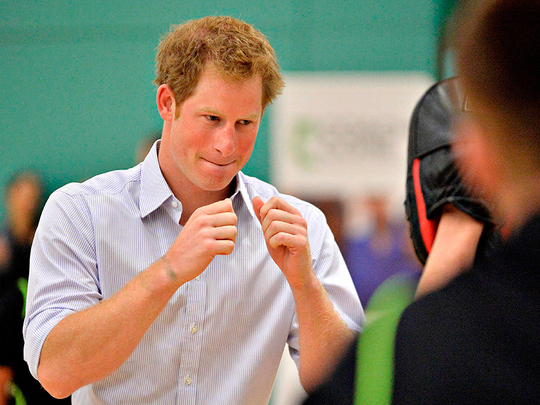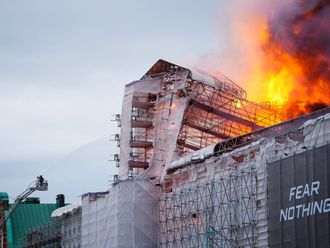
London: Prince Harry has disclosed that he sought counselling after enduring two years of “total chaos” while still struggling in his late twenties to come to terms with the death of his mother.
The Prince said in an interview with The Daily Telegraph that he “shut down all his emotions” for almost two decades after losing his mother, Diana, Princess of Wales, despite his brother, Prince William, trying to persuade him to seek help.
Disclosing that he has spoken to a professional about his mental health, he describes how he only began to address his grief when he was 28 after feeling “on the verge of punching someone” and facing anxiety during royal engagements.
Describing the “quite serious effect” that losing his mother had on his personal and professional life, he tells how living in the public eye left him feeling he could be “very close to a complete breakdown on numerous occasions”. “I can count myself very lucky,” he said. “It was 20 years of not thinking about it and two years of total chaos.” The Prince, now 32, turned to counsellors and even took up boxing. He says he is now in “a good place”.
Prince Harry has decided to give an unprecedented insight into his past in the hope it will encourage people to break the stigma surrounding mental health issues. He has spoken to The Daily Telegraph’s Bryony Gordon for the first episode of her podcast, Mad World, in which she will interview high-profile guests about their mental health experiences.
The 30-minute conversation is one of the most candid insights into the thoughts of a modern young member of the Royal family. The Prince and his brother and sister-in-law, the Duke and Duchess of Cambridge, have together driven Heads Together, a charity which promotes good mental well-being.
Prince Harry, who was 12 when his mother died, says that he spent his teenage years and twenties determined not to think about her. “I can safely say that losing my mum at the age of 12, and therefore shutting down all of my emotions for the last 20 years, has had a quite serious effect on not only my personal life but my work as well,” he said.
Of life in the public eye, he said: “I have probably been very close to a complete breakdown on numerous occasions when all sorts of grief and sort of lies and misconceptions and everything are coming to you from every angle.”
Asked whether he had been to see a “shrink” to “let it all rip”, he said: “I’ve done that a couple of times, more than a couple of times, but it’s great.”
The Prince admitted that at times he had struggled with aggression and turned to boxing as an outlet for his frustration.
“During those years I took up boxing, because everyone was saying boxing is good for you and it’s a really good way of letting out aggression,” he said. “And that really saved me because I was on the verge of punching someone, so being able to punch someone who had pads was certainly easier.”
He eventually sought support with the encouragement of his brother and others close to him, who told him: “Look, you really need to deal with this. It is not normal to think that nothing has affected you.”
Since learning to talk honestly about his feelings, he said, he now feels able to put “blood, sweat and tears” into making a difference for others. “The experience I have had is that once you start talking about it, you realise that actually you’re part of quite a big club,” he said.
Later this year, the Prince and the Duke will commemorate the 20th anniversary of their mother’s death, commissioning a statue and presenting awards in her name to honour “kindness, compassion and service”. Prince Harry said of his loss: “My way of dealing with it was sticking my head in the sand, refusing to ever think about my mum, because why would that help? “[I thought] it’s only going to make you sad, it’s not going to bring her back. “So from an emotional side, I was like ‘right, don’t ever let your emotions be part of anything’. “So I was a typical 20, 25, 28-year-old running around going ‘life is great’, or ‘life is fine’ and that was exactly it.
“And then [I] started to have a few conversations and actually all of a sudden, all of this grief that I have never processed started to come to the forefront and I was like, there is actually a lot of stuff here that I need to deal with.” Before learning to talk about his thoughts, he struggled to understand them. “I just couldn’t put my finger on it,” he said. “I just didn’t know what was wrong with me.”
Even at royal engagements, he said, he had found himself battling a “fight or flight” reaction without properly knowing why. Once he started opening up to friends, he added, he found those same friends felt able to “unravel their own issues”. D
ismissing previous speculation he may have suffered mental health issues because of his time in Afghanistan, he said he felt clear that coping with the death of his mother on a very public platform had the greatest impact.
“I can safely say it’s not Afghanistan-related. I’m not one of those guys that has had to see my best mate blown up next to me and have to apply a tourniquet to both their legs. Luckily, thank God, I wasn’t one of those people.”
Prince Harry said his work with the personnel recovery unit, where he listened to wounded, injured and sick servicemen and women talk about serious mental health issues, had proved a turning point in his understanding.
“I know there is huge merit in talking about your issues and the only thing about keeping it quiet is that it’s only ever going to make it worse,” he said. “Not just for you but everybody else around you as well because you become a problem. I, through a lot of my twenties, was a problem and I didn’t know how to deal with it.”
On seeking help, the Prince said: “It’s all about timing. And for me personally, my brother, you know, bless him, he was a huge support to me. He kept saying this is not right, this is not normal, you need to talk to [someone] about stuff, it’s OK. “The timing wasn’t right. You need to feel it in yourself, you need to find the right person to talk to as well.”
But he added: “I can’t encourage people enough to just have that conversation because you will be surprised firstly, how much support you get and secondly, how many people literally are longing for you to come out.”
Confessing he was “a little nervous, a little tight in the chest” about the interview, the Prince said he was determined to make a difference while the younger members of the Royal family are “still interesting” to the public, doing his bit before Prince George, Princess Charlotte and any of his own future children step into the spotlight.
Of his current focus on mental health, he said: “What we are trying to do is normalise the conversation to the point where anyone can sit down and have a coffee and just go ‘you know what, I’ve had a really s-- day, can I just tell about it? Because then you walk away and it’s done.” He is now in a “good place”.
“Because of the process I have been through over the past two and a half years, I’ve now been able to take my work seriously, been able to take my private life seriously as well, and been able to put blood, sweat and tears into the things that really make a difference and things that I think will make a difference to everybody else.”












